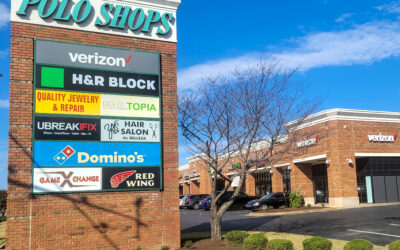Q1 2023 Market Outlook
by Matt Toczylowski
The US retail real estate market remained on an upward trajectory in the first quarter of 2023, continuing the positive momentum of the previous two years. Consumer spending, net retail absorption, new store openings, and retail rent growth all posted positive gains during the quarter. Despite the continued momentum, the sector started to exhibit signs of slowing as retail fundamentals began to feel the impact of sustained inflation, rising interest rates, and banking uncertainty.
While consumer spending grew over the quarter, the pace of growth weakened as consumers began prioritizing essential goods and services over more expensive, discretionary items. Net retail absorption, which remained positive for the 10th consecutive quarter, also grew at a more measured pace during Q1. On a more positive note, new store opening announcements far outpaced closing announcements, with discount and variety stores, auto parts retailers, and restaurants among the top retail categories planning to expand. Additionally, retail rental rates grew during the quarter, led by gains in the Neighborhood Shopping Center segment, and remained above the 10-year average.
Transaction volume in the broader retail investment sales market declined during the first quarter compared to the same quarter last year, as the sector continued to be mired by the impacts of rising interest rates and lack of deal flow. Although the investment sales market remains stubbornly motionless and the current economic environment has made it increasingly more challenging to unearth opportunities, Managers that maintain a strong commitment to business development and proactive sourcing initiatives have the potential to develop positive momentum related to future acquisitions. Here at Baceline Group, our Acquisitions department added several new opportunities to our acquisitions pipeline heading into the second quarter and are cautiously optimistic that transaction volume will remain steady in the short term.
Although troubling headlines surfaced during the first quarter regarding major bankruptcy announcements among notable retailers, including Bed Bath and Beyond, Party City, David’s Bridal, and Tuesday Morning, the Owner/Operators focused specifically on unanchored, multi-tenant assets will see minimal exposure to these “big box” tenants, which continue to face challenges with e-commerce trends and supply chain constraints. Contrary to these reports, we continue to observe an increase in leasing interest from smaller retail concepts such as medical services, professional services, quick-service restaurants, and other national operators including gym and discount retailers, which have announced plans to continue their expansions in 2023 and beyond.
The Federal Reserve continued to raise interest rates (.5% combined) in the first quarter albeit less drastically compared to the fourth quarter (2% combined). The slowdown of rate hikes was a welcome development for real estate-focused managers which began feeling the full impact of the Q4 increases during the first quarter. While the rising interest rate burden, specific to managers such as Baceline, will continue to increase, owners in retail should dedicate strict focus to offsetting higher rate increases with increase in base rent to market rates when applicable in order to capture rental rate growth and improve their financial performance.
Overall, the retail real estate sector has logged impressive growth for two consecutive years, but the continued market volatility, impacts of substantial interest rate intervention, and persistent inflationary pressures finally began to create observable economic headwinds for the industry in the first quarter. The combination of these circumstances is expected to impose yet another challenge to retail investment strategies for at least the remainder of 2023, which will require persistent discipline, creativity, and adaptability to overcome.
However, as demonstrated during previous economic downturns over the last 25 years, Neighborhood Shopping Centers have proven to be an extremely resilient and adaptable asset class. The exceptional real estate fundamentals of these centers – and the essential goods and services they provide to consumers – consistently deliver positive, long-term results that have proven to outlast temporary market volatility. While market turbulence will undoubtedly persist in the near term, the Manager is confident in the long-term outlook for the Portfolio and remains committed to optimizing the performance of the Fund in the years ahead.
ABOUT THE AUTHOR
Matt is the Vice President of Capital Development for Baceline and has spent 13 years in business development and investor relations. After 2 years of fundraising for Baceline’s retail strategies, he has found a new passion in real estate fund asset management.



